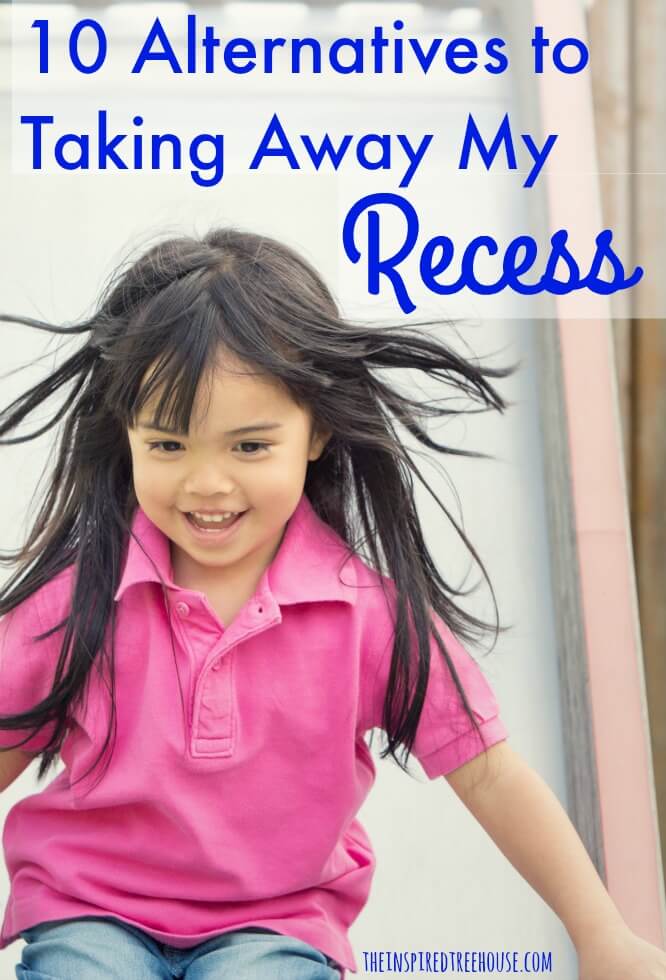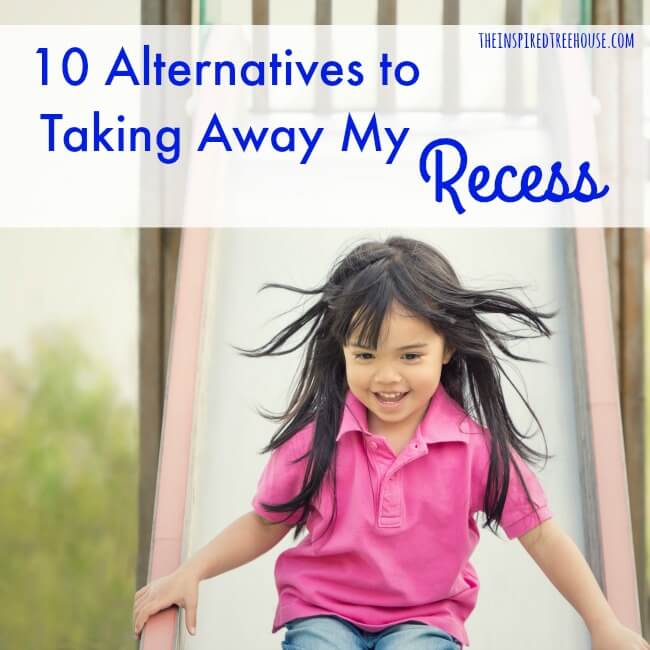Today, we’re here to make the case for recess! Learn 10 positive discipline strategies that are alternatives to removing recess as punishment for negative behavior.
By now, most of you know that we’re big advocates of free play, movement, and sensory motor exploration here at The Inspired Treehouse. Sometimes it’s disheartening to see how infrequently kids are able to get up and move during the school day when our training and experience as therapists tells us that movement and sensory exploration are the very foundation of healthy development and learning.
As much as we love using movement breaks, active learning games, and fidget toys with our kids at school, there is simply no substitution for good old-fashioned play in an open space when it comes to promoting developmental skills for kids. This is where recess comes in!
But, we’ve noticed a trend. Because recess is the most beloved and cherished part of the school day, we often hear of it being taken away as a punishment for negative behaviors in the classroom.
Today, we’re here to support teachers and administrators in thinking outside the box about behavior policies that result in the elimination of recess for kids.
The Case for Recess
The American Academy of Pediatrics says it best in its Policy Statement entitled, The Crucial Role of Recess in School: “On the basis of an abundance of scientific studies, withholding recess for punitive or academic reasons would seem to be counterproductive to the intended outcomes and may have unintended consequences in relation to a child’s acquisition of important life skills.”
The bottom line? Kids need movement and sensory input to learn, attend, and regulate their behavior and they get these movement and sensory opportunities at recess.
It has been hypothesized that some problem behaviors are directly related to a lack of participation in the very activities kids participate in during recess and other outdoor free play. “Repeat offenders” – kids who frequently demonstrate disruptive, fidgety, inappropriate, or inattentive behaviors in the classroom (and frequently end up standing to the side during recess as punishment) are likely the ones who need recess the most.
This can mean getting caught in an extremely negative cycle that is detrimental to kids’ learning, development, and self-esteem. It looks something like this: kid struggles with regulating behavior in the classroom > kid loses recess (and valuable sensory and motor experiences that can help him regulate his behavior and attend) > kid continues to misbehave in the classroom > kid loses recess. Are you seeing a pattern here? Yep. Us too.
So, we have a choice to make. Do we continue to take away recess as a punishment, or do we come up with other options to give kids more not less of what they need to regulate their bodies and behavior at school?
10 Alternatives to Taking Away Recess
We believe that unstructured free play is the most ideal way for kids to spend their recess time. But when discipline is necessary, there are alternative punishments that can still provide opportunities for kids to move and get sensory input rather than standing or sitting to the side during recess.
Here are some ideas:
1 || Walking laps around the track or playground with the teacher.
2 || Cleaning up 10 pieces of litter or wiping down slides on the playground before being allowed to play.
3 || Raking leaves or pulling weeds in the school garden.
4 || Complete 10 designated motor or sensory activities to complete before joining friends on the playground. Check out this visual choice board for brain breaks.
5 || Participate in a job that incorporates movement (e.g. stacking chairs, helping in the library or cafeteria, delivering items around the school, sweeping floor, wiping tables, washing a window) before going out to play.

6 || Losing a specific (favorite) piece of playground equipment or a specific playground activity (e.g. no football today, no jungle gym today).
7 || Losing screen time instead of recess time.
8 || Designate a recess “break space”. Draw a large rectangle on the ground with sidewalk chalk. Inside the rectangle, draw lines/paths/shapes. Instead of standing/sitting, kids can walk/run on the paths or jump/hop from shape to shape.
9 || Earning a recess reward! Instead of taking something away, what about having students work toward earning a special outdoor recess game, toy, or even extra recess for completing work or staying on track with behavior?
10 || Be the leader! Turn that negative behavior into something positive. Have the student come up with 2 games involving movement and have them lead the entire class (a unique game of tag, an obstacle course, etc).
Check out these other great resources about the importance of recess:
Recess Rocks! – Colorado Legacy Foundation

Latest posts by Claire Heffron (see all)
- Cute Zipper Bags for Therapists - April 18, 2024
- Fairy Tale Games and Toys - April 12, 2024
- The Best Emotional Regulation Books for Kids - April 8, 2024



[…] probably already know how we feel about free play, recess, and the importance of unstructured motor experiences and sensory exploration for kids. So it […]